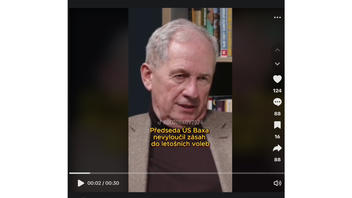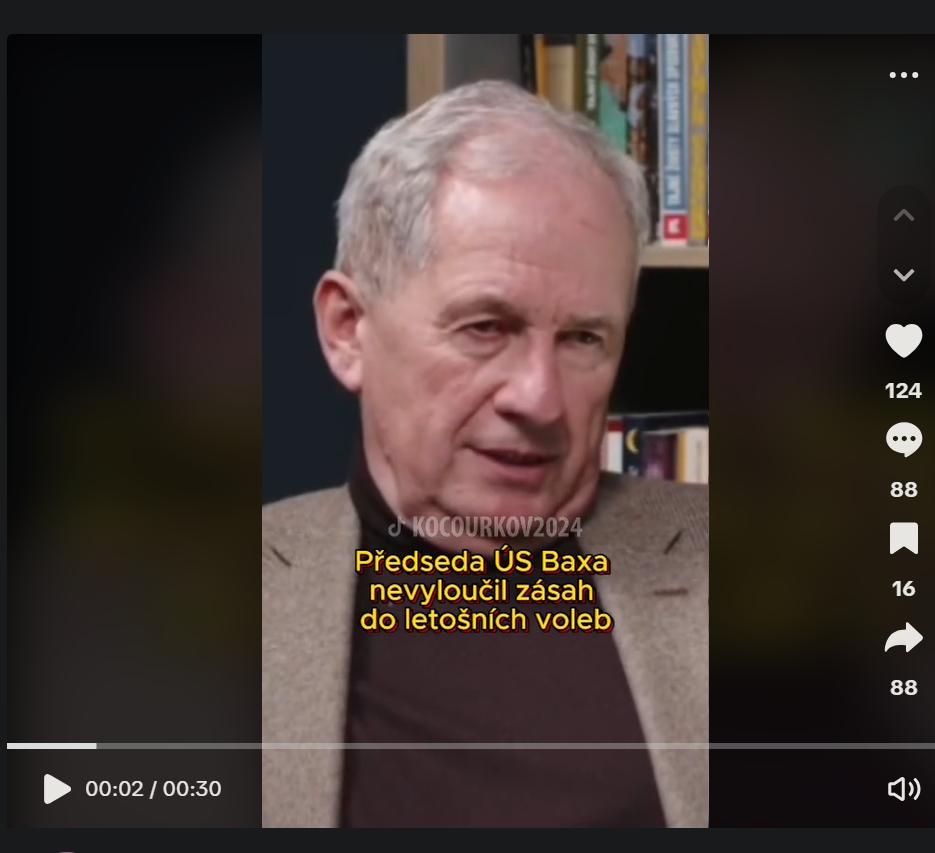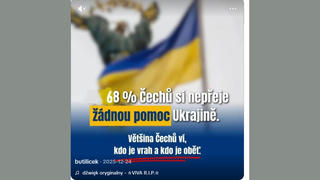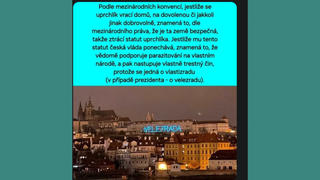
Did the head of the Czech Constitutional Court, Josef Baxa, say that the court plans to intervene in the upcoming parliamentary elections in the Czech Republic in 2025? No, that's not true: Baxa expressed his view in general terms, not referring to a specific case, in an interview on a legal podcast. He spoke of the theoretical background on how and to what extent courts should intervene in elections in case of electoral fraud, and what legal and other tools courts have at their disposal to tackle possible interferences of social media platforms. He did not refer to the Czech upcoming 2025 elections.
The claim appeared in a video (archived here) published on TikTok on January 28, 2025. The video shows the head of the Czech Constitutional Court, Josef Baxa, who speaks in an interview with podcast host Petr Dimun. The caption of the video in Czech reads, translated by Lead Stories staff: "Elections are not to be decided in courtrooms. But the judicial intervention should be present. If a situation arises that defies even the crudest morals, we will not be a court that turns a blind eye or turns away, said the head of the Constitutional Court Josef Baxa."
A text overlay in Czech on the video reads, as translated: "A Romanian scenario is in the making" and "the head of ÚS has not ruled out interference in this year's elections." "ÚS" here is an abbreviation of "Ústavní Soud," which is the Constitutional Court in Czech. Comments below the video in Czech, also translated by Lead Stories staff, include:
Is that a warning or how should I interpret it? If the right ones are not elected, will the Constitutional Court intervene? Like in Romania?
That's why these judges were elected, to go along with this government... it's unbelievable that the head of (the Constitutional Court) is already interfering in the election.
They are planning another scam.
The Romanian one has already tried it. So why not apply it in the autumn if things don't work out?
This is what the post looked like on TikTok at the time of writing:
(Source: TikTok screenshot taken on Tue Feb 4 08:00:32 2025 UTC)
The video above is an excerpt from a legal podcast hosted by Petr Dimun, whose interview (archived here) with the head of the Constitutional Court Josef Baxa (archived here) was published on the Czech news website Info.cz on January 27, 2025. Nothing Baxa said during that podcast can be interpreted as him stating that the court is planning to interfere in the 2025 elections, as falsely claimed in the TikTok.
The interview, which is almost 90 minutes long, includes an approximately 25-minute segment in which the host discusses with Baxa courts interferences (archived here) in the Czech electoral process that has occurred in the past, starting around the 19-minute mark of the podcast. Dimun mentions the Romanian Constitutional Court's decision to annul the presidential elections (archived here) in December 2024 based on intelligence reports (archived here) on one candidate's campaign on a social media platform.
Around the 25-minute mark of the podcast, Dimun asks Baxa specifically whether the Czech judges of the court are considering how they would view fraudulent campaigns influenced by bots or algorithms of global social media networks that are beyond the reach of state officials.
Baxa then responds in Czech (around the 26-minute mark of the podcast), translated by Lead Stories staff: "We are thinking about it, we are aware of our limits, the limits of knowledge and our role... Elections should not be decided in courtrooms. But the judicial intervention should be present - but we shouldn't be rattling it around... it's simply like the atomic bomb, we need to know it exists, but we're not going to uncork it every two months." This part of Baxa´s speech is also the first part of the 30-second-long TikTok video.
In the podcast, Baxa then adds that this area and "life in general" have evolved faster than legal regulations. He goes on to say that political processes during elections, such as campaigning, voting, but also day-to-day governance, even in advanced democracies, require "control mechanisms" such as independent media, constitutional courts, or upper chambers of parliaments, and that their function should not be reduced to being a mere "fig leaf" for democracy.
Baxa adds that he does not have a "clear answer," and around the 28-minute mark of the podcast, he says, referring to the court, that it definitely "does not have the ambition to have everything our way but If a situation arises that defies even the crudest morals, we will not be a court that turns a blind eye or turns away." This phrase is used in the second part of the TikTok video.
In the podcast, Dimun presses Baxa further on the issue, telling him that he might one day judge the same situation as in Romania, to which Baxa replies that such an unprecedented situation would not only be a matter for the courts, but for "the whole of society" to ensure that the essence of free elections, fair contests and campaigns that allow voters to decide, is protected and preserved.
"We need to be aware that there is an influence on voters and that the decisive one these days does not happen anymore in the squares, where voters go to listen to candidates that promise something or lambast somebody... we have to be capable of critical thinking, analyzing information, and that is a task for families and schools."
The topic of the courts' involvement in the election ends at the 38-minute mark of the podcast, and the debate then switches to other issues.
Josef Baxa (archived here) became the head of the Constitutional Court in August 2023. In the past, Czech courts also annulled elections in certain areas on specific occasions because of the legality of the procedure and its impact on the results. Czech media reported on such cases here (archived here) for instance. In 2005, the Constitutional Court overturned the decision (archived here) of a lower court (archived here) to annul the Senate elections in Prague 11 district for breaching the campaign´s rules.
On January 27, 2025, the Venice Commission (archived here), the Council of Europe's advisory body on constitutional matters, filed a report (archived here) on the Romanian Constitutional Court decision, which stated that the cancellation of part of elections or elections as a whole can be allowed only under very "exceptional circumstances." On the other hand, the Code of Good Practice in Electoral Matters (archived here) requires an effective system of appeal, and states, in particular, that "the appeal body must have authority to annul elections where irregularities may have affected the outcome," the report added.









